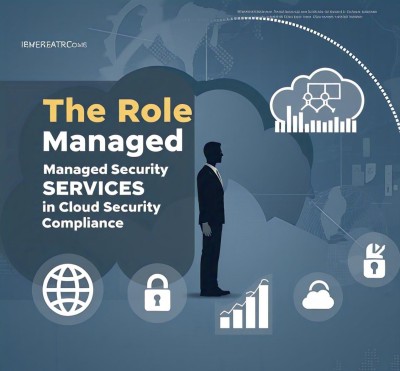The number of enterprises migrating to cloud environments is growing exponentially. At the same time, the security challenges threatening cloud computing are also expanding proportionately. Any arrangement that takes care of the cybersecurity requires performing a dual job. The call is to fortify cloud security and ensure better compliance with the regulatory norms.
Some of the top-notch security threats specific to cloud systems include data breaches, poor access controls, and compliance issues mandated by data security regulations.
However, there is a high sense of relief among enterprises and business owners as the managed security services (MSS) gained traction. These services outsourced from third-party vendors offer a range of security solutions to protect cloud resources, data, and applications with greater compliance standards.
The best MSS providers have better compliance records in coping with mandatory data privacy regulations, including GDPR, HIPAA, and CCPA.
It is no secret that cloud systems face many challenges in compliance demands. This often stems from the limited visibility within the cloud environment to detect and prepare for security threats alongside the complexity to conform to the demands of compliance requirements.
Benefits of MSS services to clients
That is where managed security services support clients in multiple ways, including the cushion of lower costs compared to the overheads in keeping an in-house team.
Coupled with the proactive and competitive approach of the chosen MSS vendor, the client gets reassurance from the round-the-clock monitoring and strategic security plan with an enhanced cloud security posture.
The managed security service providers also enforce strong authentication and access control methods that pre-empt unauthorized access to cloud resources and further tighten the identity and access management (IAM) protocols.
The managed security partner also ensures compliance requirements, as in GDPR, HIPAA, PCI DSS, etc. By integrating the managed security services to sync with regulatory compliance, seamless security in the cloud environment is achieved as sustained monitoring traces security incidents in real-time.
The compliance parameter in MSS selection
In partnering with managed security services, verifying their credentials in the area of compliance with regulatory norms will be useful in protecting sensitive data, maintaining customer trust, and avoiding hefty penalties from the violations.
Knowing how attackers take advantage of vulnerabilities in cloud infrastructure, MSS teams work hard to strengthen the access controls and the shared infrastructure to close the gaps.
The best MSS providers address the problems of insecure application programming interfaces (APIs) that endanger cloud services with an increase in vulnerability. They also showcase solutions like adequate backup and disaster recovery mechanisms to address any potential data loss event in the cloud.
Shared responsibility model in the cloud
As far as cloud security and compliance are concerned, the concept of shared responsibility plays a significant role. It demarcates responsibilities among important stakeholders in a cloud environment depending on the cloud provider, service model, and deployment model.
In cloud security, the shared responsibilities in cloud security are distributed between the cloud service provider (CSP) and the cloud service consumer (CSC). In a majority of cases, the CSP takes the bulk of that burden of responsibility in securing the cloud.
As for CSC, its responsibilities include carrying out compliance audits, contracts, and assessments to verify compliance requirements.
Rewards of better compliance
In managing and using sensitive data in the cloud, the providers and users must adhere to the compliance regulations and standards. There are mandatory security controls outlined by the Cloud Security Alliance. For example, FedRAMP is mandatory for organizations working with the US federal government, and there are rules for its compliance on cloud data regulations.
The same goes for the National Institute of Standards and Technology (NIST) for both governmental agencies and private industries.
To conclude
It is apparent that managed security services take a comprehensive mandate on security and also take the right steps to bolster compliance as required by the regulatory bodies on data safety in a cloud environment.
